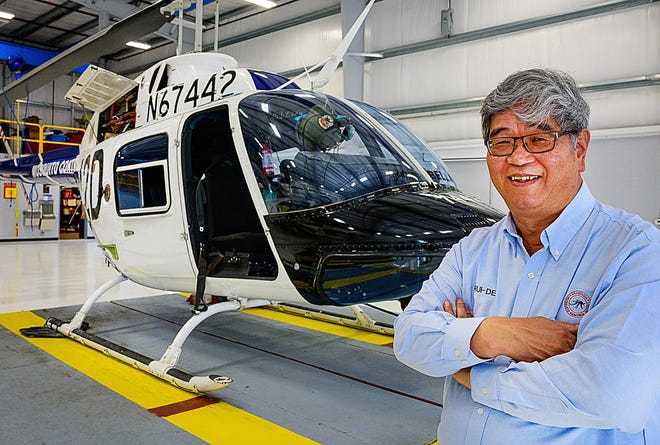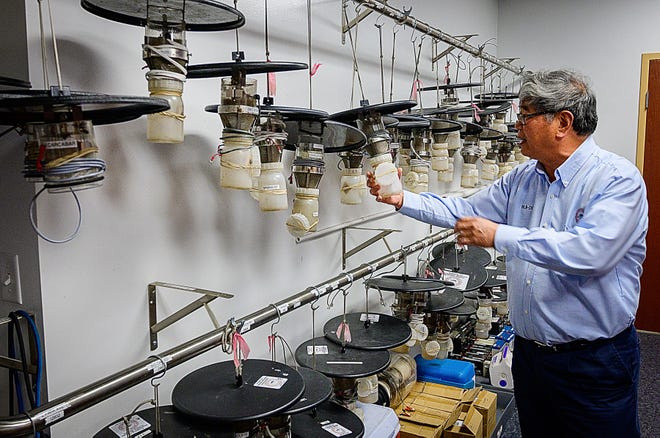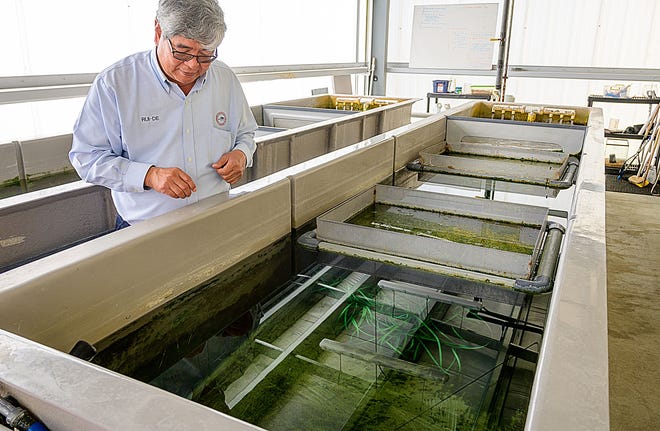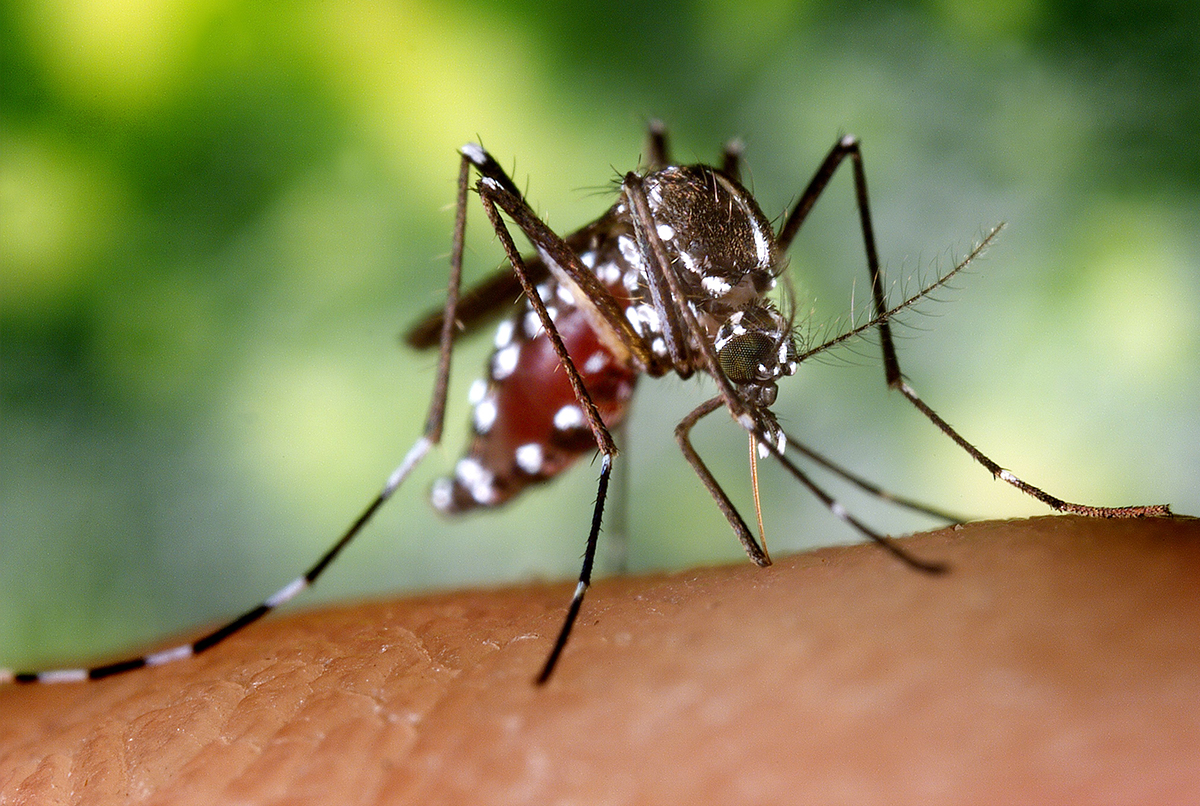Thank you, St. Augustine Record, for Sunday, March 27, 2022 article on mosquito control.
Some 700 million people get mosquito-borne diseases each year, resulting in one million deaths worldwide annually.
My late father suffered from malaria -- my dad caught it in Sicily in 1943, as a non-com with the 82nd Airborne Division, 505th Parachute Infantry Regiment.
One of the oldest soldiers in his 82nd unit on D-Day, my dad earlier served in the Pennsylvania National Guard and Civilian Conservation Corps. Dad parachuted into North Africa, Sicily and Normandy as a machine-gunner, helping save the world from Nazis and fascists. (The South Jersey Chapter of the 82nd ABN DIVN ASSN. is named after my dad, the "CPL Edward A. Slavin Chapter.")
In Sicily, a mosquito bit my dad, giving him malaria. An Army doctor, a 90-day wonder, claimed dad got malaria in North Africa, based on medical textbooks (which mosquitos don't read). Dad got malaria in the swamps of Sicily, and it changed his life, with multiple health effects
It was nearly twelve years after their marriage at Fort Benning (Alabama side) that my parents had their only child, a feat that required prayers to St Jude, the patron Saint of hopeless causes. My mom told me the chances of my being born were one in 100,000.
Growing up, I saw my father suffer with the aftereffects of a mosquito-borne disease.
That's why I'm running for a seat on the board of our Anastasia Mosquito Control District of St. Johns County.I've been speaking out on St. Johns County mosquito control issues since 2006.
I read Rachel Carson's book about pesticides, Silent Spring, when I was twelve. Thanks to environmental laws, our bald eagles and other endangered and threatened species are now recovering. Did you know that we had 35 nesting pairs of bald eagles in St. Johns County?
Thanks to our indefatigable Mosquito Control Commission Chairwoman, Ms. Jeanne Moeller, a two-time cancer survivor, AMCD has changed its ways. Instead of abusing organophosphate poisons, AMCD is mostly using natural pesticides (like Gambusia fish to devour mosquito larvae and BTI, a bacillus that Israeli scientists learned gives mosquito larvae a fatal gut-ache).
I was so proud of Commissioner Moeller and former Commissioner John Sundeman, C.P.A. for their leadership on cutting AMCD waste.In particular, a no-bid $1.8 million brand-new Bell Jet helicopter contract was cancelled and a full refund was obtained.
It took ten months to turn around an impulse-buying decision from days when Sheriff DAVID SHOAR lobbied AMCD to buy the helicopter, unequipped with a single nozzle, tank, pilot, plan or landing place!
The then-Chair was unseemly in efforts to suppress public questions, even calling the Sheriff to intimidate us at meetings after former Army Captain Don Girven, environmentalist Robin Nadeau, Ann Palmquist, others, and I persisted in asking questions and demanding answers. Two-then Commissioners even appeared to violate Sunshine laws about "security," videotaped and broadcast on cable tv, a story very well covered, with six (6) inculpatory photos from the video, all on the front page of the St. Augustine Record with the pair talking to AMCD's then lawyer after a meeting
After much public debate about Sunshine, AMCD finally found a new lawyer who would answer my question about the contact violation of public policy under the Restatement of Contracts, 2d, Sec. 178-- the helicopter purchase was illegal because it violated AMCD's 1992 purchasing policy, Our new lawyer got us a full refund, and the contract was cancelled for the good of the taxpayers
Freed of the helicopter scandal, AMCD has since 2007 blossomed as a world leader on mosquito control, with research and education empowering life-saving techniques of killing and controlling the mosquito, the deadliest animal on Earth. AMCD voted to pay living wages and forbade anti-LGBTQIA+ discrimination before any other local government agencies.
Kudos to AMCD Chair Jeanne Moeller, the AMCD Board and AMCD staff for wise leadership.
Thank you, Dr. Xue and Chair Moeller!
Chair Moeller is retiring and I have filed to run for the seat she has filled since 2007.
I've joined the American Mosquito Control Association and attended its annual meeting in Jacksonville earlier this. month.
The independence of AMCD, an independent, non-partisan special taxing district, protects scientific integrity, our health and our environment.
We must always guard against another politically-motivated St. Johns County Commission takeover attempt, as was plotted circa 2007-2008 under County Commission Chairman THOMAS MANUEL and County Administrator MICHAEL DAVID WANCHICK who, advised by corpulent PFM consultants, coveted AMCD's money and taxing powers.
SJC BoCC Chair MANUEL once told Dr. Dwight Hines, Ph.D. and I that if the County took over AMCD, he and our County Commission would assign it to the Road and Bridge Department, and that mosquito control would only need to devote "20 minutes" to it each year. We, the People, stopped this plan, rejecting Commissioners' nonsensical, noisome nostrum.
Protection of public health and our environment is a big job, requiring professionalism and good science.
If elected, I pledge to honor our Constitution and to preserve, protect and defend it and our laws, protecting good science to protect public health from mosquito-borne diseases.From St. Augustine Record:
.
Tenacity and vision: St. Johns County mosquito leader gets top award
Rui-De Xue entered field after seeing, experiencing harm caused by mosquito-borne illnesses
 Sheldon Gardner
Sheldon Gardner
Many local residents probably don't know that a top-notch mosquito control district is defending them from the tiny enemies in their own backyard.
The Anastasia Mosquito Control District serves St. Johns County and has blossomed over the years – it is also led by a scientist who recently received one of the top awards in mosquito control.
The district's executive director, Rui-De Xue, received the Medal of Honor from the American Mosquito Control Association this year, the association's top award. It's given to people judged by their peers to have made exceptional contributions in the mosquito control field.
Coming soon:Plans buzz along for multimillion-dollar mosquito museum in St. Johns County
We would not be where we are now if it were not for Dr. Xue's input and if it were not for his tenacity and absolutely sticking with it, and his vision," said Anastasia Mosquito Control District Commissioner Jeanne Moeller, who has been on the board for about 16 years.
The Anastasia Mosquito Control District provides mosquito control services across the county, both working to kill mosquitoes, reduce their population and prevent disease through treatment, monitoring, research and education.
The district is separate from county government, levying its own taxes and controlling its own operation through Xue and a board of commissioners.
The district's headquarters is at 120 EOC Drive in St. Augustine near the State Road 16 and Interstate 95 interchange. The complex includes research facilities and laboratories. And, soon, it will include a multimillion-dollar public education center.
But, of course, the main focus of a mosquito control district is to keep the public safe. St. Johns County has gone for close to 20 years without any locally acquired mosquito-borne diseases, Xue said.

"Florida really is the so-called capital city of mosquitoes," he said.
He came to the Anastasia Mosquito Control District in March of 2003, working his way up from entomologist to director in 2005. He led the way in expanding the district's research capabilities, including requesting a lab and insectary to be built after he arrived.
He also focused on increasing prevention through public education ― like reminding people to drain containers with standing water in their yards ― increasing educational opportunities for employees, expanding research capabilities, pursuing grants and increasing mosquito monitoring.
His areas of expertise include vector biology and behavioral ecology of mosquitoes, and development and evaluation of personal protection and repellant, according to the district. Among other things, "He is one of major contributors for attractive toxic or target sugar baits and bait stations to control adult mosquitoes."
Mosquito subterfuge and other advancements
One example of mosquito control advancements is the district's mosquito sterilization program.
In 2018, district officials spoke with The Record about a pilot program conducted in a 20-acre zone in West Augustine.
The district released thousands of mosquitoes multiple times a week that had been injected with a bacteria called Wolbachia, which is common among insects. But based upon research done by the company MosquitoMate, when the males go to mate with the females, they are rendered sterile and no eggs are hatched.
Female mosquitoes are the only ones that bite and lay eggs, increasing the population and spreading disease. The goal of the sterilization program is to prevent transmission of mosquito-borne diseases and also reduce the population.
The district is working on a sterile insect technique plan that should be finished in February 2023, according to Xue.
"We plan to mass (rear) Wolbachia-infected male Aedes aegypti and (Aedes) albopictus mosquitoes and irradiated male mosquitoes for release to control (the) natural population in (the) middle of 2023," he wrote in an email to The Record.
The district centralized from four stations to one over the years. It opened in its current location, a new complex, in 2016, Xue said. The new location has allowed the district to increase its grants and has received more than $2 million in grants since the move, he said.
The complex cost more than $4 million to build and came after the district doubled its millage rate in 2014, though it has been reduced since then. The district can't take on debt. The district also acquired helicopters to handle its own aerial spraying, which launched in 2019.
The commission reduced the millage rate from 0.205 to 0.2 mills in 2021. The district's expenses for this fiscal year were expected to be about $9.9 million.
Some research areas for the district: "Behavioral ecology and management of mosquitoes; evaluation of new control methods, tools and equipment; evaluation of surveillance methods and tools for vector and nuisance mosquito populations; insecticide resistance surveillance;" and "efficacy of larvicides and adulticides for mosquito control," according to the district.

The district has a team of around 30 employees, including biologists, mosquito control technicians and an education specialist. People from other states and countries come to the district to learn and train, and professors and students conduct research at the district. The district also educates students in the St. Johns County School District.
The district plans to open a 6,000-square-foot complex to educate both children and adults about mosquitoes, mosquito control and insect-borne diseases in July. The center will also educate researchers. The cost was expected to be about $3 million. The district plans to hold an open house at the facility in June during National Mosquito Control Awareness Week, Xue said.
Among other contributions, Moeller said she plans to travel to Mali, Africa, this year to talk about the district's work with district Scientific Manager/Entomologist Whitney Qualls, in hopes of helping communities better protect there people against mosquito-borne disease. She said it's not a taxpayer funded trip. Grants are helping, but officials will help pay their own way, she said.
"Really we've just come a long way," Moeller said about the district's operations now versus when she first started as a commissioner. "It's the difference between night and day."

No comments:
Post a Comment